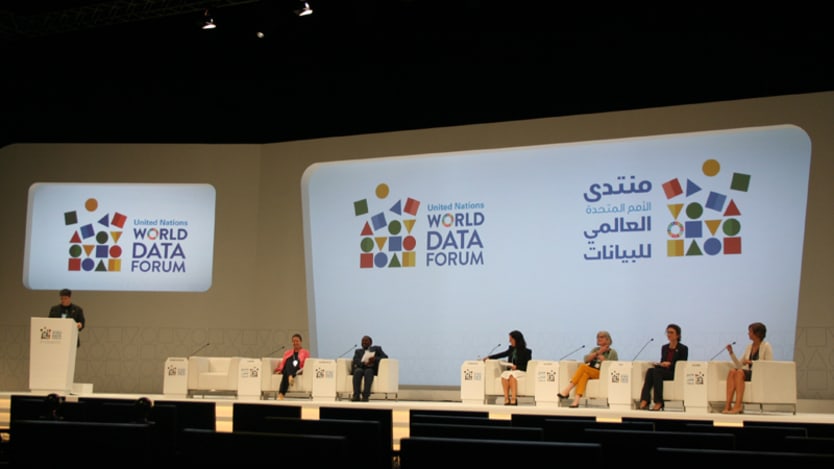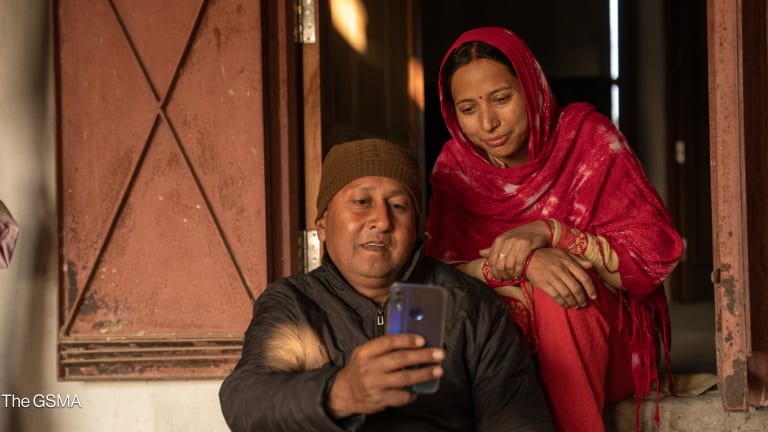
DUBAI, United Arab Emirates — Making the invisible visible within national data systems was an important area of discussion at the United Nations World Data Forum. Invisible population groups in data are commonly the most vulnerable populations — women and girls, people with disability, refugee and migrants, and the elderly.
Disaggregating data, or breaking it down beyond total figures into sex, age, disability, and more, helps enable better detail and insight. But convincing governments to demand better data within their own borders is not always easy.
Data supporting women and girls
Whether it is demographics, health, employment, and other data, breaking it down by gender seems simple. But without political will or understanding the value of doing so, there can be limited impetus.
Highlighting the problem is the first part in creating change. The U.N. forum is hosting five sessions dedicated to gender. Sessions highlighted the value of civil registration data – births, deaths, and marriages – to better support the needs of women and girls through targeted government programs, including education, health, and land rights.
More on the UN World Data Forum:
► At UN World Data Forum, a focus on data capacity
► Solutions to the big data challenge at the UN World Data Forum
The forum also emphasized the need to collect and analyze data to address gender-based violence in a dedicated session. Through detailed, but sensitive surveys with both women and men, progress has been made in countries such as Italy, Mexico, and Vietnam to highlight the widespread nature of GBV and implement programs and policies to better support women and change the conversation on violence against women.
Four sessions hosted by Data2x demonstrated the ways that gender gaps in data could be minimized — through big data, interactive storytelling, and by ensuring data collection methodologies are adjusted to enable population breakdowns by gender across a range of datasets supporting development programs.
Using data effectively to drive government initiatives was discussed often, with a focus on encouraging governments to continue collecting gendered data to enable analysis of progress.
Disability
At a session on disability data, panelists spoke about the need for data to be inclusive of people with disability, a commonly invisible but highly vulnerable population in data.
The United Kingdom Department for International Development and other public sector speakers highlighted the work some governments are doing to address the gap through better data collection methodologies. But the development and humanitarian community is needed to support the collection, many noted.
Dominic Haslam, director of policy and program strategy with Sightsavers, discussed his organization’s contribution to collecting, reporting, analyzing, and utilizing data on age, disability, sex, economic status, and location — as well as sharing tools and learnings with government and nongovernment partners.
Leonard Cheshire and Humanity & Inclusion launched at new report on how humanitarian and development organizations are using Washington Group Questions to support the collection of disability data — not only highlighting work done to date but emphasizing the importance of more organizations joining in to collect data.
The elderly
The needs of aging and elderly populations is another area of concern for sustainable development where better data could assist in directing better programs and policies.
Sarah Crofts, head of analysis for aging and demography with the U.K.’s Office for National Statistics, explained that by 2050, 2 billion people — or a fifth of the global population — will be considered elderly. Enabling better data now is critical.
And beyond that, concerns of growing agism were brought up at the forum. Alex Mihnovits, global age watch and data manager with HelpAge International, said that data could contribute to breaking down stereotypes. Data shows elderly populations in the Philippines, Thailand, and Vietnam are not economically reliant on their children, for example. And by collating data on elderly rights and access to health care, advocates could help to push for improved services in developing countries.
With concerns of agism also come concerns of violence. Papa Seck, chief statistician with UN Women, explained that indicators supporting the Sustainable Development Goals for gender equality and empowerment of women and girls include the need to address violence by age. And increasingly there is evidence of violence against the elderly.
Collating the data on elderly abuse, Seck explained, will provide an evidence base to address the issue. But this means developing standards to ensure definitions and methods of collection are consistent, which UN Women is now working on.
Migration and refugees
Speaking at a session on migration statistics, Under-Secretary-General for Economic and Social Affairs Liu Zhenmin emphasizing the economic, innovation, and development benefit of international migration — including remittance flows to low- and middle-income countries which reached $466 billion in 2017. Such economic arguments can help spur political drive for the collection of data on migrants and migration — with detail on age, sex, disability, and more.
Currently, Liu explained, the outlook for detailed quality data on migration is not good.
“Three years after the adoption of the 2030 agenda, the picture for accurate and disaggregated migration data is not optimistic. There is a paucity of basic data on international migration, and existing data are not fully utilized or shared. For example, 17 percent of countries in Africa and 12 percent in Asia have not produced official statistics on the number of international migrants since 2005.”
Migration data collection is highly politicized. While some countries collect it, they do not share it. And others that are collecting data are considering stopping the process to prevent domestic backlash.
When it came to encouraging countries to collect and supply data, said Petra Nahmias, a senior statistician with the U.N. Refugee Agency, the key is to urge collaboration and build confidence that the release of data will not negatively impact governments domestically.
Missing from the missing
A glaring area of vulnerable populations missing from discussion at the U.N. World Data Forum were LGBTI populations.
Francesca Grum, chief of the social and gender statistics section with the United Nations Statistics Division, told Devex the U.N. currently did not collect data on LGBTI populations. But despite this, it is becoming an areas of focus.
“The international statistical community is starting to look into the issue of measuring SOGI [Sexual Orientation and Gender Identity] orientation and gender identity,” she said. “A few countries are testing methods and want to share them with/get feedback from the international level.”
While the forum has made leaps and bounds in highlighting the challenges around data gaps and progress that is being made to address them, it is just the start. The third forum in 2020 will need to continue identifying and addressing the gaps in global data sources — including the challenges of LGBTI populations — to enable programs and initiatives supporting the most vulnerable to truly meet their needs.
Lisa Cornish attended the U.N. World Data Forum as a Data2X press fellow.








